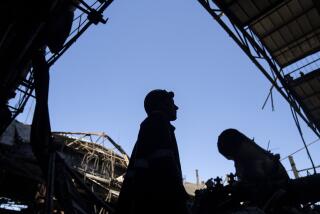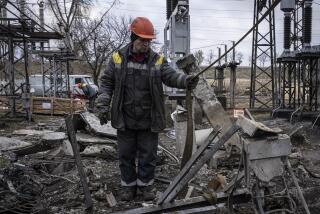A Russian Commander Shows Who’s Got Power
MOSCOW — When Maj. Gen. Konstantin Svidersky, commander of a strategic missile base in Siberia, learned that the security of his base was under threat, he did what any commander would do: He sent out his troops to eliminate the threat.
The target? Four electric substations. The enemy? The local electric company, which had threatened to cut off power.
Heavily armed commandos stormed the substations in Siberia’s southern Altai region two weeks ago and forced out the employees at gunpoint. The standoff has continued ever since. State television broadcast footage Tuesday night of troops with green head scarves and charcoal-blackened faces on guard along a fence, automatic rifles at the ready.
“I have the troops and means necessary to provide my rocket complexes with as much electric power as I need,” Svidersky said in the broadcast. “If that means I have to place armed guards around these substations, I will do it regardless of their managers’ wishes.”
In Soviet times, public utilities were, in effect, provided free by the state. Power plants have since struggled to get large users, especially government agencies, to pay their bills.
But the Altai standoff is believed to be only the second time that troops were mobilized as part of such a dispute. In September 1995, armed troops forced workers at two substations on the northern Kola Peninsula to turn on the electricity to their nuclear submarine base after it had been shut off because of unpaid bills.
Vladimir Konovalov, chief of the Altaienergo power company, complained that the military had dangerously escalated the situation in Altai by calling out the troops.
“I can buy pistols and submachine guns for my staff . . . but where would that lead?” Konovalov said. “To a Chechnya in the Altai territory?”
Arkady Korolyuk, a duty officer at Altaienergo, confirmed by phone from the region that the missile base, located in the village of Sibirsky about 1,800 miles east of Moscow, owes about $180,000.
“The situation is really absurd. We sent them a quite legal warning which we send to all our debtors that we would switch off power supply if they don’t pay in time,” he said. “Their reaction came as a total surprise.”
He said that the commandos are refusing entry to all power company employees and that, without maintenance, there soon may be power failures all over the region, including at the base.
“There is a very good Russian saying: If you are strong, you don’t need brains,” he said. “I guess that applies to our situation now.”
Before the nation’s financial crisis in August 1998, the central government had a serious cash squeeze and could not meet its budget requirements for federal agencies and regional governments, which in turn could not pay local workers and businesses. However, in recent months the “nonpayments” problem has eased considerably, and reports of serious conflicts over unpaid bills also have diminished.
Pavel Felgenhauer, a military analyst with the Sevodnya daily newspaper, said strategic missile bases have independent emergency power systems, so the apparent threat to the base is probably overblown. He suggested that the Altai incident could be a stunt by the military to lobby for more funding, especially since the new national government in Moscow is compiling its budget for next year.
Military bases “just don’t pay their electricity bills, and they don’t care. They know they will not be forcibly cut off. They think they can put the money to better use,” he said. “Sometimes this leads to conflicts, but the military usually turns such conflicts into a PR campaign to underscore their needs before the Finance Ministry. . . . That’s why we see this saber-rattling on television with lots of color and interviews.”
For the past nine months, Russia has waged an expensive war in the separatist republic of Chechnya, but there is little sign that the war is draining federal coffers: High world oil prices have brought in higher revenues for the government for the past year.
*
Sergei L. Loiko of The Times’ Moscow Bureau contributed to this report.
More to Read
Sign up for Essential California
The most important California stories and recommendations in your inbox every morning.
You may occasionally receive promotional content from the Los Angeles Times.










